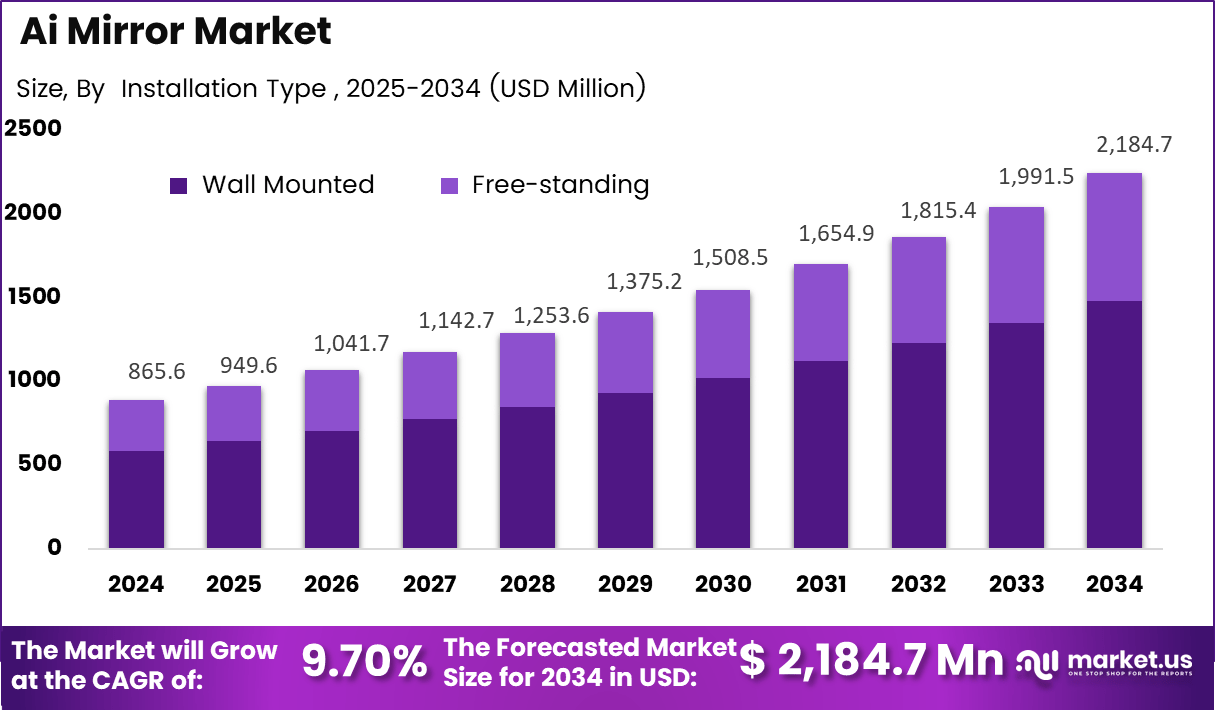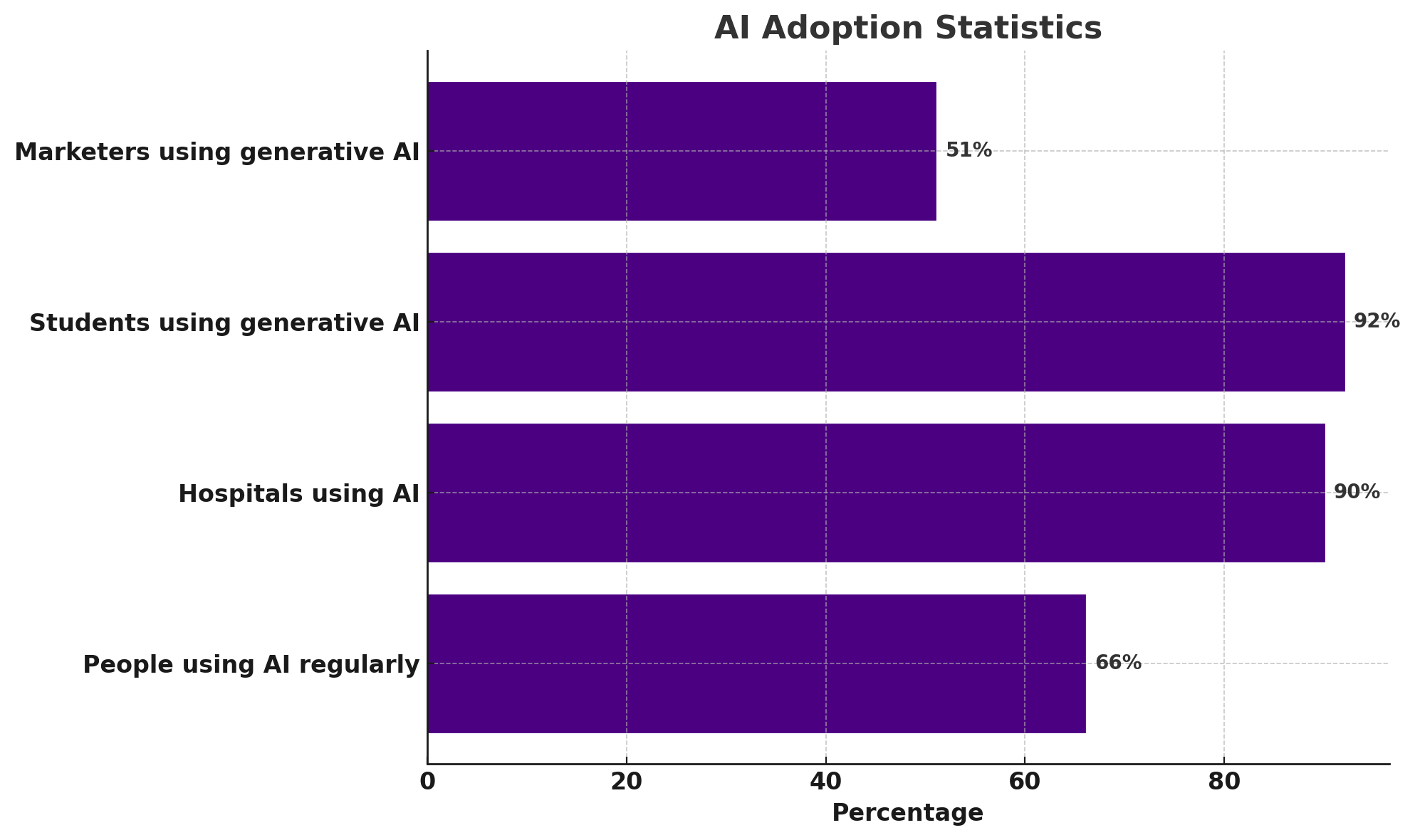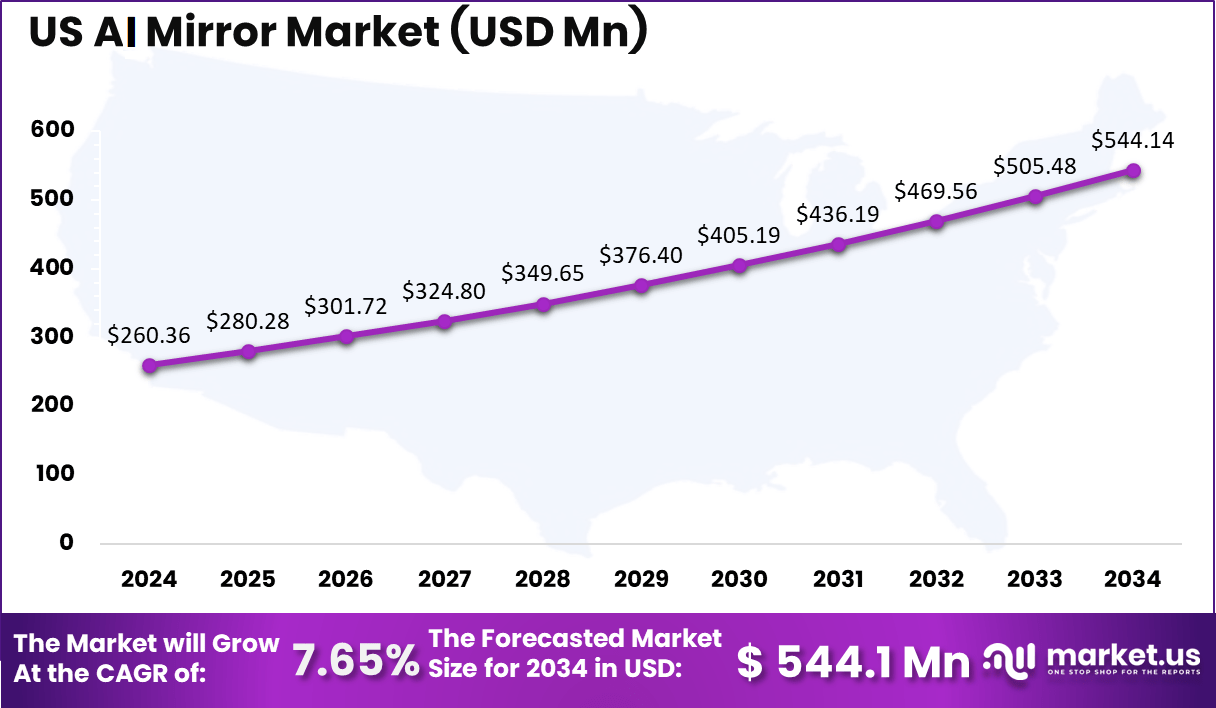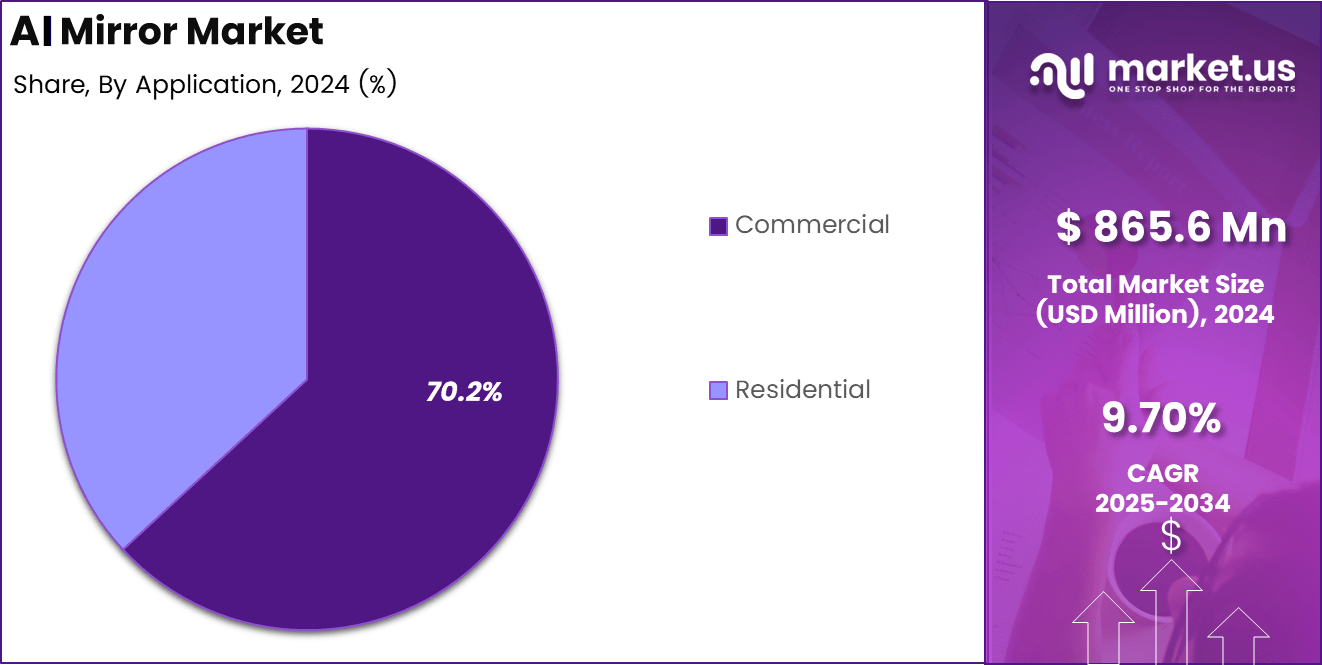Global AI Mirror Market Size, Share, Industry Analysis Report By Installation Type (Wall Mounted, Free-standing), By Application (Residential, Commercial), By Distribution Channel (Online, Offline), By Region and Companies - Industry Segment Outlook, Market Assessment, Competition Scenario, Trends and Forecast 2025-2034
- Published date: Oct. 2025
- Report ID: 161109
- Number of Pages: 304
- Format:
-
keyboard_arrow_up
Quick Navigation
- Report Overview
- Top Market Takeaways
- AI Adoption and Investment
- Business Value of AI
- US Market Size
- By Installation Type
- By Application
- By Distribution Channel
- Key Market Segment
- Key Regions and Countries
- Driver Analysis
- Restraint Analysis
- Opportunity Analysis
- Challenge Analysis
- Key Players Analysis
- Recent Developments
- Report Scope
Report Overview
The Global AI Mirror Market, valued at approximately USD 865.6 million in 2024, is projected to reach around USD 2,184.7 million by 2034, expanding at a CAGR of 9.7% during the forecast period from 2025 to 2034. In 2024, North America held a dominan market position, capturing more than a 34.78% share, holding USD 301.0 Million revenue.
The AI mirror market covers smart mirrors that use artificial intelligence for functions such as virtual try-ons, body tracking, skincare analysis, fitness guidance, and personalized recommendations. These mirrors combine displays, cameras, sensors, and AI software to provide interactive experiences at home, in retail stores, gyms, salons, and medical settings. Adoption is growing as consumers and businesses look for contactless, data-driven, and personalized solutions.

Top Driving Factors for the AI mirror market include increasing consumer interest in smart devices that blend convenience and personalization. A significant driver is the rising adoption of AI technologies that provide real-time, tailored user experiences, such as virtual product testing in retail and health diagnostics in healthcare.
Government initiatives promoting smart cities and IoT adoption further boost market growth. For instance, the US Department of Energy’s smart technology programs support development of AI mirrors integrated in smart infrastructures. Additionally, advances in AI capabilities like facial recognition and voice interaction amplify demand, pushing growth rates to nearly double digits in some regions.
The increasing adoption of technologies like IoT, augmented reality (AR), machine learning, and biometric sensors propels the AI mirror market forward. IoT enables connections between devices for seamless data exchange, while AR adds immersive virtual overlays on reflections, allowing users to virtually try products or get fitness feedback. Biometric features such as facial and voice recognition enhance personalization and security.
Top Market Takeaways
- 67.6% share was held by wall-mounted installations, showing strong consumer preference for fixed smart mirror designs.
- 70.2% share came from commercial applications, highlighting adoption in retail, salons, gyms, and hospitality.
- 76.9% share was captured by online distribution, reflecting digital-first purchasing behavior and e-commerce dominance.
- 34.78% share was taken by North America, positioning it as the leading regional market.
- The U.S. market recorded strong adoption at USD 260.36 million, supported by a CAGR of 7.65%, reflecting steady growth momentum.
AI Adoption and Investment

Summary Table: AI Investment & Business Gains
Insights Value People using AI regularly 66% Hospitals using AI 90% Students using generative AI 92% Marketers using generative AI 51% Business Value of AI
Investment Opportunities in the AI mirror space are significant due to the market’s rapid innovation and increasing integration across industries. Investors are drawn by potential in sectors like fitness, healthcare, automotive, and retail, where AI mirrors add measurable value. Emerging technologies within AI mirrors, including more sophisticated AR applications and biometric security, open new avenues for product differentiation.
Furthermore, government-backed smart city projects and healthcare modernization initiatives add to opportunities by funding infrastructure that supports AI mirror deployment. The intersection of physical and digital intelligence in these devices is a promising frontier for strategic investments. Business Benefits of AI mirrors include enhanced operational efficiency and improved consumer engagement.
By automating routine tasks like product testing and customer interaction, AI mirrors free resources and reduce costs. Their data-collection capabilities support better inventory management and personalized service offerings. Moreover, interactive AI mirrors heighten user engagement, increasing purchase likelihood and brand visibility. For businesses, this equates to increased sales, lower return rates, improved customer insights, and competitive advantage in a technology-driven marketplace
US Market Size
The US AI Mirror Market is valued at USD 260.36 million in 2024 and is projected to reach approximately USD 544.14 million by 2034, growing at a CAGR of 7.65% during the forecast period. Growth is driven by rising adoption of smart home ecosystems, connected retail experiences, and AI-integrated beauty and wellness technologies.
Growing awareness of AI mirror benefits, such as personalized experiences and enhanced interaction, is accelerating adoption. The US ecosystem supports innovation through numerous startups and established tech players focused on embedding AI into everyday devices, reinforcing the country’s leadership position in this fast-evolving market.

In 2024, North America holds a strong 34.78% share in the AI mirror market, reflecting early adoption of smart home and commercial technologies. The region’s sophisticated infrastructure and high consumer disposable income contribute to broad acceptance of AI-enabled smart mirrors. Many businesses in retail, hospitality, and healthcare sectors actively integrate these mirrors to enhance experiences and efficiency.
North America’s growth is supported by advancements in related technologies like AI algorithms, sensors, and augmented reality. This region leads in innovation and implementation, setting standards for global AI mirror use. The competitive market landscape encourages continuous improvement and customization to meet consumer needs.

By Installation Type
In 2024, Wall-mounted AI mirrors dominate the market with a significant 67.6% share. This preference is largely due to their ability to save space and offer a sleek, integrated look in residential and commercial environments. Wall-mounted models reduce floor clutter and have a lower risk of damage compared to free-standing mirrors. Their integration typically allows better connectivity with smart home or business systems, enhancing user convenience.
Consumers and businesses favor wall-mounted installations because they enhance the aesthetic of rooms while providing advanced features such as touch controls, voice commands, and augmented reality overlays. In commercial setups, such as retail stores and hotels, these mirrors optimize space usage and provide modern, interactive customer experiences that free-standing models cannot as easily deliver.
By Application
In 2024, The commercial segment accounts for a commanding 70.2% of the AI mirror market. This strong share is driven by sectors like retail, hospitality, and corporate offices where interactive mirrors improve customer engagement and operational efficiency. Retail stores, for example, use AI mirrors for virtual try-ons and product recommendations, reducing the dependence on physical samples.
Additionally, commercial installations benefit from AI mirrors’ ability to personalize user experiences, offer real-time data insights, and enhance branding. These features lead to better customer satisfaction and loyalty. The commercial sector’s appetite for innovative technology makes it the most lucrative area, with businesses increasingly adopting AI mirrors to create smart, connected environments.

By Distribution Channel
In 2024, Online sales dominate the distribution landscape with a share of 76.9%. The preference for online purchasing stems from the convenience of browsing extensive product selections, comparing features and prices, and reading user reviews without the need to visit physical stores. Moreover, online channels provide manufacturers and retailers direct customer access, allowing quicker updates and promotions.
The surge in e-commerce is highlighted by the growing presence of AI mirror brands on platforms like Amazon and specialized tech websites. Buyers typically appreciate the flexibility of delivery options and the ability to order from anywhere, making online the most dynamic distribution channel despite ongoing value in offline retail.
Key Market Segment
By Installation Type
- Wall Mounted
- Free-standing
By Application
- Residential
- Commercial
By Distribution Channel
- Online
- Offline
Key Regions and Countries
- North America
- US
- Canada
- Europe
- Germany
- France
- The UK
- Spain
- Italy
- Rest of Europe
- Asia Pacific
- China
- Japan
- South Korea
- India
- Australia
- Singapore
- Rest of Asia Pacific
- Latin America
- Brazil
- Mexico
- Rest of Latin America
- Middle East & Africa
- South Africa
- Saudi Arabia
- UAE
- Rest of MEA
Driver Analysis
Growing Adoption of AI Technologies
The primary force behind the growth of the AI Mirror market is the increasing integration of AI into everyday devices. Consumers and industries alike are seeking smarter and more personalized experiences, which AI mirrors deliver through features like facial recognition, gesture control, and health tracking.
This technology transforms a simple mirror into an interactive hub, enhancing convenience and functionality in homes, healthcare, retail, and automotive sectors. For instance, AI mirrors help improve driver safety by providing real-time alerts or enable personalized health monitoring at home. This growing demand for connected and intelligent devices is fueling rapid market expansion.
Governments and businesses are also actively supporting AI technologies to drive innovation and efficiency. Public initiatives and policies promoting smart city and IoT infrastructure increase the adoption of AI-powered mirrors as part of connected ecosystems. The combination of evolving AI algorithms and increasing consumer interest in smart home solutions positions AI mirrors as a key growth area in smart technology markets globally.
Restraint Analysis
High Costs and Privacy Concerns
One significant barrier slowing AI mirror adoption is the high cost of advanced components and development. Integrating artificial intelligence, sensors, cameras, and displays into mirrors demands considerable investment, which results in expensive products. This cost factor limits accessibility for many consumers and small businesses, especially in price-sensitive markets.
Additionally, fluctuations in raw material prices, including semiconductors, push production costs higher, thus restraining broader market penetration. Another critical restraint is privacy concerns related to personal data collection through features like facial recognition.
Consumers and regulators are increasingly worried about data security and misuse of sensitive information. With stricter data privacy laws, such as GDPR in Europe, companies must navigate complex compliance requirements. These privacy issues pose challenges for market players to gain consumer trust and may slow deployment in certain regions.
Opportunity Analysis
Expansion in Healthcare Applications
The healthcare sector offers a promising growth avenue for AI mirrors. These smart devices can support telemedicine by enabling remote health monitoring, vital signs tracking, and personalized fitness guidance. AI mirrors enhance patient care by allowing convenient health diagnostics at home, reducing the need for in-person visits.
This capability aligns well with the increasing demand for accessible and automated healthcare solutions globally, especially with rising chronic disease prevalence and aging populations. Reports indicate that the telemedicine market is expanding rapidly, expecting a CAGR exceeding 20% in upcoming years, which complements AI mirror growth.
Furthermore, AI mirrors can assist healthcare providers with useful data analytics and improve patient engagement. This sector’s potential positions healthcare as a key area for AI mirror market expansion beyond consumer electronics.
Challenge Analysis
Technological Complexity and Competitive Pressure
Developing AI-powered mirrors involves managing multiple advanced technologies simultaneously, such as computer vision, natural language processing, augmented reality, and real-time analytics. Handling this complexity increases the risk of technical failures or malfunctions, which can damage consumer confidence and slow market growth.
Companies need robust R&D investments to innovate while ensuring stable performance and usability. Additionally, the market landscape is becoming highly crowded with many companies, including both startups and established tech firms, competing intensely.
This competition may trigger price wars, squeezing profit margins and making it harder for players to differentiate their products. Firms must continuously innovate and build strong brands to sustain growth amid fierce rivalry while avoiding user dependency risks, especially in critical applications like healthcare.
Key Players Analysis
The AI Mirror Market is led by established smart mirror manufacturers such as ELECTRIC MIRROR, INC., Seura, and Majestic Mirror & Frame. These companies integrate voice assistants, touch interfaces, smart lighting, and display panels into mirror systems for residential, hospitality, and commercial settings.
Specialized and design-focused brands including Hidden Television, Reflected, Lumia Design, and Evervue USA Inc. offer mirrors equipped with AI features such as health tracking, virtual try-ons, media streaming, and environmental control. Their solutions emphasize aesthetic integration, premium build quality, and compatibility with IoT ecosystems and smart appliances.
Emerging and regionally active players such as AVIS Electronics Company, Foshan Eterna Intelligent Bathroom Co., Ltd., Videotree, and other contributors are expanding the market through affordable smart mirror models and customizable designs. These companies are targeting smart homes, retail spaces, fitness centers, and wellness environments, driving wider adoption of AI-enabled mirror technologies globally.
Top Key Players
- ELECTRIC MIRROR, INC.
- Seura
- Hidden Television
- Majestic Mirror & Frame
- AVIS Electronics Company
- FOSHAN ETERNA INTELLIGENT BATHROOM CO., LTD.
- Reflected
- Lumia design
- Evervue USA Inc.
- Videotree
- Other Major
Recent Developments
- September 2025, Lumia design released multiple smart mirror models under its 2025 lineup, incorporating advanced AI features and high-resolution imaging technologies previously demonstrated in their smartphone devices. These models emphasize mid-range affordability while maintaining premium AI-driven interaction.
- January 2025, At CES 2025, smart mirror technology saw a breakthrough with new AI-powered health monitoring integration and seamless 4G connectivity, highlighting enhanced telehealth and wellness features for mirrors used in retail and homes. This development points to AI mirrors becoming central to health tracking in everyday life.
Report Scope
Report Features Description Market Value (2024) USD 865.6 Mn Forecast Revenue (2034) USD 2,184.7 Mn CAGR(2025-2034) 9.70% Base Year for Estimation 2024 Historic Period 2020-2023 Forecast Period 2025-2034 Report Coverage Revenue forecast, AI impact on Market trends, Share Insights, Company ranking, competitive landscape, Recent Developments, Market Dynamics, nd Emerging Trends Segments Covered By Installation Type (Wall Mounted, Free-standing), By Application (Residential, Commercial), By Distribution Channel (Online, Offline) Regional Analysis North America – US, Canada; Europe – Germany, France, The UK, Spain, Italy, Russia, Netherlands, Rest of Europe; Asia Pacific – China, Japan, South Korea, India, New Zealand, Singapore, Thailand, Vietnam, Rest of Latin America; Latin America – Brazil, Mexico, Rest of Latin America; Middle East & Africa – South Africa, Saudi Arabia, UAE, Rest of MEA Competitive Landscape ELECTRIC MIRROR, INC., Seura, Hidden Television, Majestic Mirror & Frame, AVIS Electronics Company, FOSHAN ETERNA INTELLIGENT BATHROOM CO., LTD., Reflected, Lumia design, Evervue USA Inc., Videotree, Other Major, Customization Scope Customization for segments, region/country-level will be provided. Moreover, additional customization can be done based on the requirements. Purchase Options We have three licenses to choose from: Single User License, Multi-User License (Up to 5 Users), Corporate Use License (Unlimited Users, Printable PDF) 
-
-
- ELECTRIC MIRROR, INC.
- Seura
- Hidden Television
- Majestic Mirror & Frame
- AVIS Electronics Company
- FOSHAN ETERNA INTELLIGENT BATHROOM CO., LTD.
- Reflected
- Lumia design
- Evervue USA Inc.
- Videotree
- Other Major













